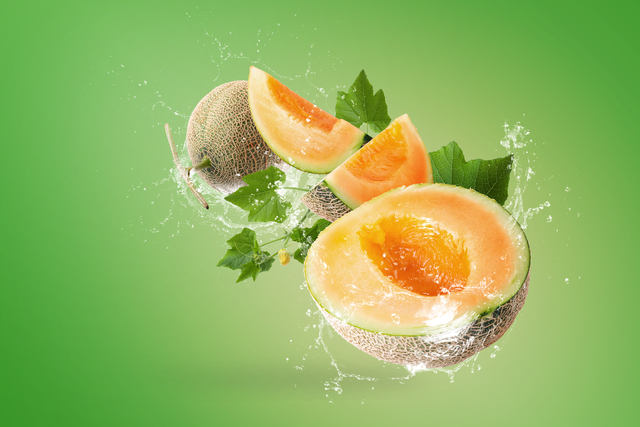Can Dogs Eat Cantaloupe? A Comprehensive Guide
Hello fellow dog lovers! As someone who not only loves fruit but also their furry friend, I’ve often wondered about the various human foods that my pooch can safely enjoy. It led me to researching the impacts different foods have on dogs, and eventually to asking the question: “Can dogs eat cantaloupe?”
Today, let’s discuss cantaloupes. Delicious and refreshing for us, but can dogs eat cantaloupe?
Understanding Cantaloupe: What is it?
Its name is derived from the Italian papal village of “Cantalup,” where it was first cultivated around the 15th century.
Cantaloupe is typically a summer fruit, but with modern agricultural methods, it’s now available in many places year-round. However, they are at their best from June through August when they are in season and at the peak of their flavor.
Nutritional Facts About Cantaloupe
This fruit is not only delicious but also packed with essential vitamins, nutrients, and antioxidants. Cantaloupe is a low-calorie fruit that’s packed with vitamins A and C, both of which are beneficial for your dog’s immune system. It’s also a good source of dietary fiber, vitamin B6, niacin, folate, and magnesium.
But while it’s a delightful addition to our diet, how does it fare when it comes to sharing it with our furry friends? Can dogs eat cantaloupe? Let’s delve into that.
The Great Debate: Can Dogs Eat Cantaloupe?
When it comes to answering the question, “Can dogs eat cantaloupe?” the response is a resounding yes! Cantaloupe is safe for dogs to eat, and can even offer some health benefits when fed in moderation. However, as with any food, there are important guidelines to follow and potential issues to be aware of.
Potential Benefits of Cantaloupe for Dogs
Cantaloupe is more than just a tasty treat for dogs; it’s also packed with numerous health benefits. Here are some reasons why cantaloupe might be a good addition to your dog’s diet as an occasional treat:
1) Rich in Vitamins:
Cantaloupe is an excellent source of vitamins A, C, and B-6. Vitamin A is essential for your dog’s eye health and immune function. Vitamin C, an antioxidant, can help protect the body’s cells from damage. Vitamin B-6 supports brain development and helps ensure that the nervous system functions correctly.
2) High in Fiber:
Cantaloupe contains a good amount of dietary fiber. Fiber aids digestion and can help keep your dog feeling full, which is especially beneficial for dogs on a diet.
3) Hydrating:
With a high water content, cantaloupe can help keep your dog hydrated, especially during the hot summer months.
4) Low Calorie:
Despite its sweet taste, cantaloupe is relatively low in calories. This makes it a great treat option for dogs on a weight management plan.
5) Antioxidant Properties:
Cantaloupe is high in antioxidants, which can help fight free radicals in your dog’s body. This can support overall health and potentially prevent certain diseases.
6) Supports Healthy Skin and Coat:
The vitamins and antioxidants found in cantaloupe can contribute to a healthier skin and coat in dogs.
While cantaloupe offers many benefits, it’s important to remember that these benefits are best obtained when this melon is served in moderation and as part of a balanced diet. Always consult with your veterinarian before making any significant changes to your dog’s diet.
Potential Risks of Cantaloupe for Dogs
While cantaloupe can be a safe and healthy treat for dogs when given in moderation, there are a few potential risks and precautions to be aware of:
1) Choking Hazard:
The seeds and rind of the cantaloupe can pose a choking hazard for dogs, especially smaller breeds. Always remove these parts before giving cantaloupe to your dog.
2) Digestive Upset:
Like any new food, cantaloupe might not agree with all dogs. Some dogs may experience gastrointestinal upset, including diarrhea or stomach discomfort, particularly if they eat too much.
3) High in Sugar:
While cantaloupe is low in calories, it is high in natural sugars. Too much sugar, even natural sugars, can lead to obesity and other health problems in dogs, including diabetes.
4) Allergic Reactions:
Though it’s rare, dogs can be allergic to cantaloupe. Signs of an allergic reaction may include itching, swelling, difficulty breathing, and other symptoms. If your dog exhibits any of these symptoms after eating cantaloupe, contact your vet immediately.
5) Pesticides and Bacteria:
If not washed properly, cantaloupe skin can harbor pesticides and bacteria, such as Salmonella, which can make your dog sick. It’s crucial to wash cantaloupes thoroughly before cutting into them, even if you plan to remove the rind.
To avoid these potential risks, always introduce cantaloupe slowly into your dog’s diet and monitor for any adverse reactions. Also, make sure to prepare it safely by removing the seeds and rind and thoroughly washing the fruit beforehand. As always, when in doubt, consult with your veterinarian.
Safe Cantaloupe Consumption Tips for Dogs
Feeding your dog cantaloupe can be a delightful experience for them if done correctly. Here are some tips to make sure your furry friend enjoys this treat safely:
1) Wash the Cantaloupe:
Prior to cutting the cantaloupe, give it a good rinse under running water. This helps to remove any bacteria or pesticides that may be present on the skin, which could contaminate the fruit when you cut into it.
2) Remove the Rind and Seeds:
The hard rind and small seeds of a cantaloupe can pose a choking hazard to your dog. Always remove these before offering cantaloupe to your pet.
3) Cut into Small, Manageable Pieces:
Depending on the size of your dog, you might need to cut the cantaloupe into small, bite-sized pieces to prevent choking and make it easier for your pet to eat.
4) Start with Small Portions:
Especially when introducing any new food to your dog, it’s best to start with small amounts. Too much cantaloupe at once could cause stomach upset. Over time, if your dog doesn’t show any adverse reactions, you can gradually increase the portion size.
5) Consider it as a Treat, Not a Meal:
Cantaloupe, while nutritious, should not replace your dog’s regular diet. Treats (including fruit) should make up no more than 10% of your pet’s daily caloric intake. The remaining 90% should come from their balanced, high-quality dog food.
6) Monitor Your Dog:
Watch your dog after they eat cantaloupe. If you notice any changes in behavior, bowel movements, or overall health, contact your vet immediately. These could be signs of an allergic reaction or other health issues related to the fruit.
Remember, every dog is different, and what works well for one might not work as well for another. Always consult with your vet before introducing new foods into your dog’s diet, especially if your dog has a pre-existing health condition.
What To Do If Your Dog Eats Too Much Cantaloupe
Even with safe foods, too much of a good thing can be a bad thing. Overconsumption of cantaloupe can lead to gastrointestinal upset in dogs due to its high fiber and sugar content. Here’s what to do if your dog eats too much cantaloupe:
1) Monitor Your Dog:
If your dog has eaten a large amount of cantaloupe, keep an eye on them for any signs of discomfort or ill health. Symptoms to look out for include diarrhea, vomiting, lethargy, or changes in behavior.
2) Keep Them Hydrated:
Just like in humans, diarrhea or vomiting can lead to dehydration in dogs. Ensure that your dog has access to plenty of fresh water.
3) Offer Bland Foods:
If your dog has a mild upset stomach, a bland diet can help soothe their digestive system. Foods like plain boiled chicken and rice are often recommended.
4) Contact Your Vet:
If your dog shows severe symptoms, or if their symptoms continue for more than a day, it’s time to call the vet. They can provide you with the best advice based on your dog’s overall health and specific situation. In some cases, your vet may advise you to bring your dog in for a check-up.
5) Prevent Future Overeating:
To avoid future cantaloupe-induced stomach upsets, make sure to store cantaloupe (and all food) out of your dog’s reach. When offering cantaloupe or any new food to your dog, start with small quantities and monitor their response.
Remember, cantaloupe is not harmful to dogs when served in moderation, but it’s always best to consult with your vet if you have any concerns about your pet’s health or diet.
Alternatives to Cantaloupe for Dogs
If your dog doesn’t like cantaloupe or can’t have it for some reason, other fruits such as blueberries or sliced apples can be a great alternative.
Consult With Your Vet
If you’re considering adding cantaloupe or any other new food to your dog’s diet, it’s always a wise move to consult with your vet first. Here’s why:
1) Every Dog is Unique:
Just like humans, every dog is unique with their own dietary needs and sensitivities. What works for one dog may not work for another. Your vet, who is familiar with your dog’s health history and nutritional needs, is the best person to advise you.
2) Underlying Health Issues:
Some dogs may have underlying health issues like diabetes, kidney problems, or gastrointestinal conditions that could be affected by a change in diet. Certain foods, even healthy ones like cantaloupe, might not be suitable for these dogs. Your vet can provide personalized advice based on your dog’s health condition.
3) Balanced Nutrition:
While cantaloupe can provide certain nutrients, it should not replace a balanced, species-appropriate diet for your dog. Your vet can guide you on how to incorporate new foods into your dog’s diet while ensuring they are still getting all the nutrients they need.
4) Allergies or Food Intolerance:
While uncommon, dogs can have food allergies or intolerance. If your dog has never had cantaloupe before, your vet may suggest introducing it slowly and in small quantities to monitor for any adverse reactions.
5) Portion Size:
Too much of anything, even healthy food, can lead to obesity and other health issues in dogs. Your vet can advise you on the right portion size for your dog, based on their size, age, breed, and activity level.
So, before you share that juicy piece of cantaloupe with your furry friend, give your vet a quick call to ensure it’s the best choice for your dog.
Conclusion
While dogs can eat cantaloupe, moderation is key. Always prepare it properly and monitor your dog for any adverse reactions. Cheers to happy, healthy snacking for our furry friends!
Can Dogs Eat Cantaloupe FAQ
Can puppies eat cantaloupe? Yes, puppies can eat cantaloupe. However, as their digestive systems are more sensitive, it is crucial to introduce it slowly and in small quantities. Always ensure the cantaloupe is ripe and free of seeds and rind to prevent choking or digestive issues.
How much cantaloupe can I give my dog? The amount of cantaloupe your dog can eat depends on their size, dietary needs, and individual tolerance. As a general rule, treats (including fruit like cantaloupe) should make up no more than 10% of your pet’s daily calorie intake.
What other fruits can my dog eat? Many fruits are safe for dogs to eat, including bananas, apples (seeds removed), blueberries, strawberries, and watermelon (seeds and rind removed). As with cantaloupe, all should be given in moderation and appropriately prepared to avoid choking hazards or digestive upset.
What should I do if my dog ate cantaloupe seeds or rind? If your dog has ingested cantaloupe seeds or rind, monitor them closely for signs of gastrointestinal upset or blockage, including vomiting, diarrhea, loss of appetite, or lethargy. If you notice these symptoms or if your dog appears uncomfortable, contact your veterinarian immediately.
Are any parts of the cantaloupe toxic to dogs? No parts of the cantaloupe are toxic to dogs, but the seeds and rind can pose a choking hazard or potentially cause a blockage in the digestive tract. Therefore, it’s important to only feed your dog the ripe flesh of the cantaloupe and always in moderation.




